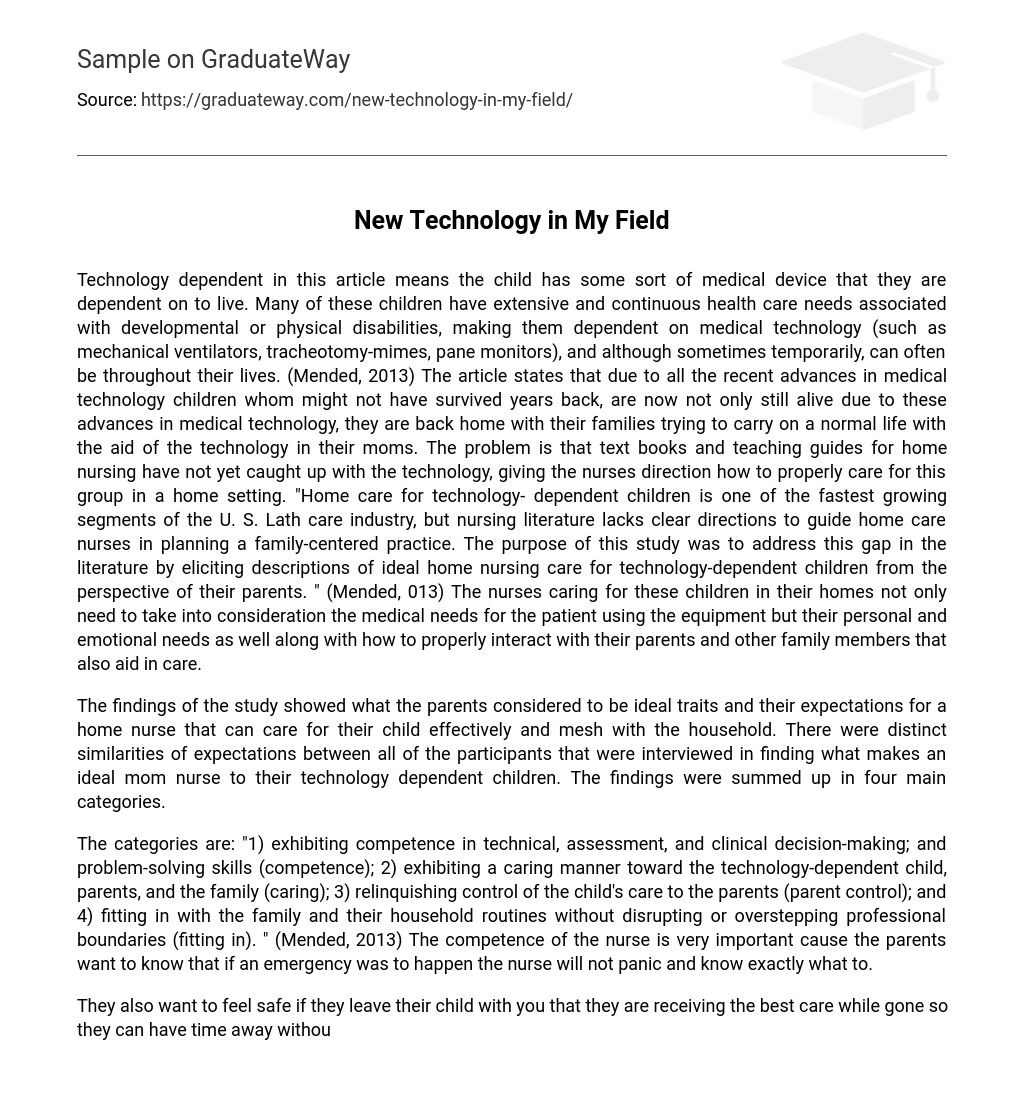Technology dependent in this article means the child has some sort of medical device that they are dependent on to live. Many of these children have extensive and continuous health care needs associated with developmental or physical disabilities, making them dependent on medical technology (such as mechanical ventilators, tracheotomy-mimes, pane monitors), and although sometimes temporarily, can often be throughout their lives. (Mended, 2013) The article states that due to all the recent advances in medical technology children whom might not have survived years back, are now not only still alive due to these advances in medical technology, they are back home with their families trying to carry on a normal life with the aid of the technology in their moms. The problem is that text books and teaching guides for home nursing have not yet caught up with the technology, giving the nurses direction how to properly care for this group in a home setting. “Home care for technology- dependent children is one of the fastest growing segments of the U. S. Lath care industry, but nursing literature lacks clear directions to guide home care nurses in planning a family-centered practice. The purpose of this study was to address this gap in the literature by eliciting descriptions of ideal home nursing care for technology-dependent children from the perspective of their parents. ” (Mended, 013) The nurses caring for these children in their homes not only need to take into consideration the medical needs for the patient using the equipment but their personal and emotional needs as well along with how to properly interact with their parents and other family members that also aid in care.
The findings of the study showed what the parents considered to be ideal traits and their expectations for a home nurse that can care for their child effectively and mesh with the household. There were distinct similarities of expectations between all of the participants that were interviewed in finding what makes an ideal mom nurse to their technology dependent children. The findings were summed up in four main categories.
The categories are: “1) exhibiting competence in technical, assessment, and clinical decision-making; and problem-solving skills (competence); 2) exhibiting a caring manner toward the technology-dependent child, parents, and the family (caring); 3) relinquishing control of the child’s care to the parents (parent control); and 4) fitting in with the family and their household routines without disrupting or overstepping professional boundaries (fitting in). ” (Mended, 2013) The competence of the nurse is very important cause the parents want to know that if an emergency was to happen the nurse will not panic and know exactly what to.
They also want to feel safe if they leave their child with you that they are receiving the best care while gone so they can have time away without the stress of worry. “Participants emphasized the importance of nurses’ critical thinking skills, including the ability to accurately assess their child, anticipate problems, devise a solution to a problem, and intervene promptly to solve problems or avoid an emergency. ” (Mended, 2013) The parents are looking beyond the physical care for their children as important s that is the study also found that parents take mental and emotional care to be as important.
They don’t want someone treating their child like they are not a human. They want a nurse that makes their child feel cared for like a mother would and is approachable and forms a bond. The whole point to having their child cared for in the home is to try to make the most out of life even if their stuck to a machine. It will show if you care only for your job or the actual patient and how they feel emotionally from day to day. The nurse also needs to understand that they may know what to do medically and by the book in certain situations UT the parent is the overall authority over the child.
There may be certain things they can pick up on by just being the parent that a nurse wouldn’t and it is important to relinquish control sometimes and always listen to what the parents’ wishes are. This goes along with fitting in with the family as well you need to understand what is expected of you and how the family feels and reacts to certain things. “According to Elaine, an understanding of the difference between hospital and home care also meant nurses needed to be flexible and able to adapt to the needs of more than one child and family at a time.
You might get en mom like myself who is a total control freak, and you might get your next patient whose mom just wants the nurse to do everything. You might get one mom that’s excited when things don’t go well and another one that goes ‘Oh, he’ll live. ‘ ” (Mended, 2013) The more time you take to get to know the family and understand them the better overall dynamics of your care for their technology dependent child will be. I found this article to be very informative and easy to read. I can now understand more clearly what it takes to be a nurse and what it is like to come into someone’s home to care for a technology dependent child.





